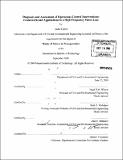| dc.contributor.advisor | Nigel H.M. Wilson, Rabi G. Mishalani and John P. Attanucci. | en_US |
| dc.contributor.author | Carrel, André, S.M. Massachusetts Institute of Technology | en_US |
| dc.contributor.other | Massachusetts Institute of Technology. Dept. of Civil and Environmental Engineering. | en_US |
| dc.date.accessioned | 2010-05-25T20:54:34Z | |
| dc.date.available | 2010-05-25T20:54:34Z | |
| dc.date.copyright | 2009 | en_US |
| dc.date.issued | 2009 | en_US |
| dc.identifier.uri | http://hdl.handle.net/1721.1/55152 | |
| dc.description | Thesis (S.M. in Transportation)--Massachusetts Institute of Technology, Dept. of Civil and Environmental Engineering, 2009. | en_US |
| dc.description | Cataloged from PDF version of thesis. | en_US |
| dc.description | Includes bibliographical references (p. 178-180). | en_US |
| dc.description.abstract | Service control, the task of implementing the timetable in daily operations on a metro line, plays a key role in service delivery, as it determines the quality of the service as provided to passengers. This thesis proposes a framework for the study of rail service control which builds on the integration and analysis of data from multiple sources and on background knowledge about service control. The framework takes into account the decision environment in which service control takes place and acknowledges that the reliability of the system depends on many factors which are endogenous to it, aspects previously not recognized in a comprehensive manner by researchers and practitioners alike. This research makes use of automatically generated operational and passenger data, which are increasingly available and accessible to transit agencies and allow for addressing questions in service control from multiple perspectives. As a result, this study takes a distinctly different approach than previous research, which has mostly focused on individual service control strategies and relied heavily on modeling and on simplifying assumptions about the objectives and constraints of service control on a metro line. The developed framework consists of four main elements. First, the controller's decision environment is integrated and described based on an extended visit of the author to a control center. Second, an algorithm for reconstructing train operations from signaling data and identifying service control interventions is presented. Third, a measure for assessing the impact of the interventions on operations is introduced. | en_US |
| dc.description.abstract | (cont.) The fourth and final element is a set of passenger travel time and reliability measures. The framework is applied to the Central line, a high-frequency line of the London Underground where the control center observations were also made. Three common service control strategies are assessed in terms of their impact on operations and on passengers, and the influence of timetable variables on the frequency of service control interventions is investigated. From observations at the control center, it is found that aside from the objective of maintaining adequate levels of service from an operations perspective and minimizing the impact of schedule deviations on passengers, considerations relating to crew and rolling stock management, safety and infrastructure capacity have a major influence on service control decisions. Given the uncertain environment in which service control operates, a strong preference among controllers for manageable and robust solutions is observed. In the analysis of common control strategies, it is found that in the absence of official policies on the response to certain types of problems on the line and in the presence of the multitude of factors mentioned above, service controllers have developed rules of thumb which may not always be optimal from the passengers' perspective. Furthermore, the fundamental tradeoff is highlighted between the availability of spare resources in form of drivers, trains and infrastructure capacity and the need for service control interventions. | en_US |
| dc.description.abstract | (cont.) Regarding the influence of timetable variables, it is found that an increase in scheduled service frequency and in running times on an otherwise unchanged line operating close to its capacity caused significant increases in numbers of service control interventions, mostly due to a higher rolling stock requirement and reduced operational flexibility. Recommendations are made with regards to service control policies, the structure of responsibilities among operational staff, the design of the timetable and the design of the operations control system. Although the results provided by the applications are specific to the Central line, they demonstrate how the elements of the framework can be implemented in a practical setting, and many of the conclusions of this thesis are transferable to other metro lines and systems. Finally, future research in passenger behavior and crew management in the presence of service control interventions is proposed. | en_US |
| dc.description.statementofresponsibility | by André Carrel. | en_US |
| dc.format.extent | 190 p. | en_US |
| dc.language.iso | eng | en_US |
| dc.publisher | Massachusetts Institute of Technology | en_US |
| dc.rights | M.I.T. theses are protected by
copyright. They may be viewed from this source for any purpose, but
reproduction or distribution in any format is prohibited without written
permission. See provided URL for inquiries about permission. | en_US |
| dc.rights.uri | http://dspace.mit.edu/handle/1721.1/7582 | en_US |
| dc.subject | Civil and Environmental Engineering. | en_US |
| dc.title | Diagnosis and assessment of operations control interventions : framework and applications to a high frequency metro line | en_US |
| dc.type | Thesis | en_US |
| dc.description.degree | S.M.in Transportation | en_US |
| dc.contributor.department | Massachusetts Institute of Technology. Department of Civil and Environmental Engineering | |
| dc.identifier.oclc | 607531524 | en_US |
